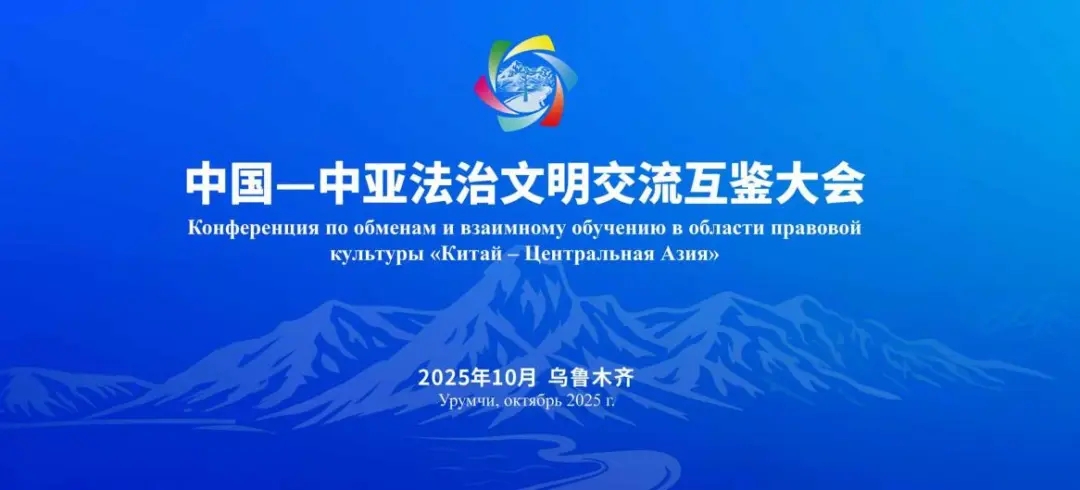
China and Central Asian countries have, throughout their long histories, cultivated distinct yet mutually illuminating legal civilizations. In the current era, as the global governance system undergoes profound adjustments and cultural diversity becomes increasingly prominent, further strengthening the exchanges and mutual learning among legal civilizations is of far-reaching significance for advancing the building of a community with a shared future for mankind.
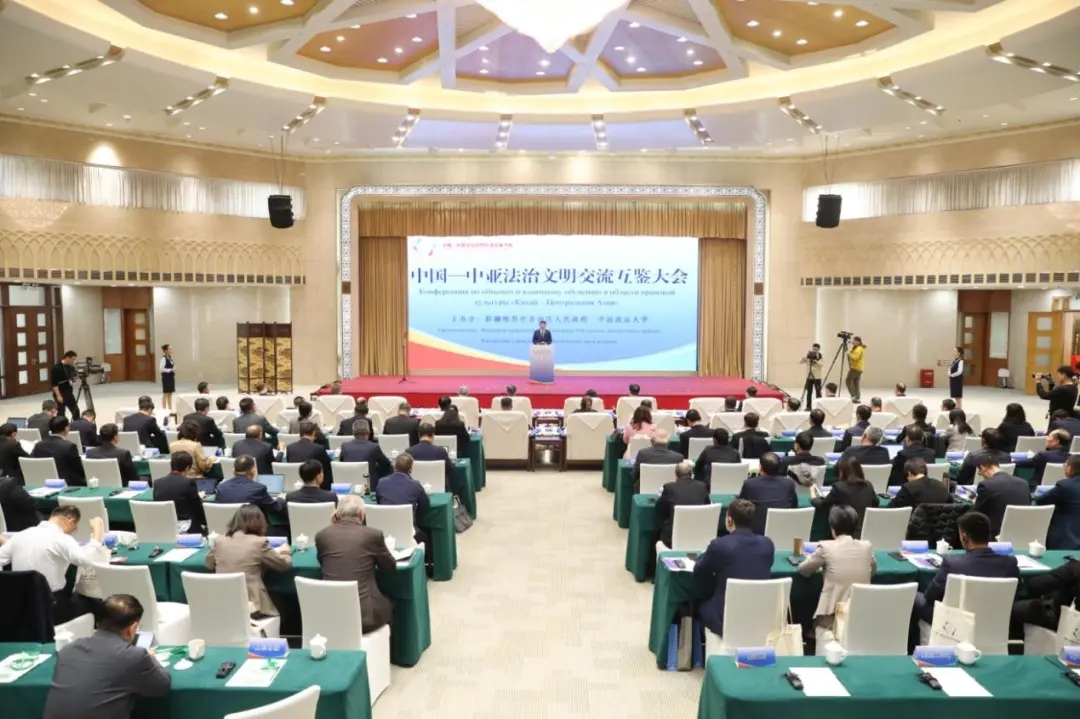
China-Central Asia Conference on Legal Civilization Exchange and Mutual Learning Convenes in Urumqi
On October 21, the China-Central Asia Conference on Legal Civilization Exchange and Mutual Learning, co-hosted by the People’s Government of the Xinjiang Uygur Autonomous Region and China University of Political Science and Law (CUPL), was held in Urumqi. More than 100 leaders, experts and scholars from the legal education, theoretical and practical sectors of China and the five Central Asian countries gathered to dialogue on the exchanges and mutual learning of legal civilizations. They joined hands to build a regional legal education community and promote the exchanges, integration, mutual learning and shared progress of the China-Central Asia legal civilizations.
The conference was attended by distinguished guests and institutional leaders, including: Wu Zeng, Vice Minister of Justice of the People’s Republic of China; Qian Feng, Member of the Standing Committee of the 14th National Committee of the Chinese People’s Political Consultative Conference (CPPCC), Deputy Director of Committee for Social and Legal Affairs, and Vice President of the China Law Society; Chen Mingguo, Deputy Party Secretary of the CPC Xinjiang Uygur Autonomous Region Committee and Secretary of the Political and Legal Affairs Commission; Wang Jianxin, Member of the Standing Committee of the CPC Xinjiang Uygur Autonomous Region Committee and Director of the Publicity Department. Heads of participating universities and institutions from China and Central Asia were also present. These included representatives from Al-Farabi Kazakh National University, Kunaev University, Maksut Narikbaev University, Tajik National University, Tajik State University of Law, Business and Politics, Westminster International University in Tashkent, Tashkent State University of Law, Kyrgyz National University, Samarkand State University, Astana International Financial Center Court and International Arbitration Center, The Center for Strategic Studies under the President of the Republic of Tajikistan, Renmin University of China, Wuhan University, Jilin University, CUPL, Zhongnan University of Economics and Law, Southwest University of Political Science and Law, East China University of Political Science and Law, Northwest University of Political Science and Law, Gansu University of Political Science and Law, Xinjiang University, Xinjiang Normal University, Xinjiang University of Political Science and Law, Xinjiang Police College, and Shenzhen University. The CUPL delegation included Jiang Zeting, Chair of the University Council; Ma Huaide, President of CUPL; and Yu Fei and Wang Hongsong, Vice Presidents of CUPL. Pan Xi, Vice Chairman of the People’s Government of the Xinjiang Uygur Autonomous Region, presided over the opening ceremony.
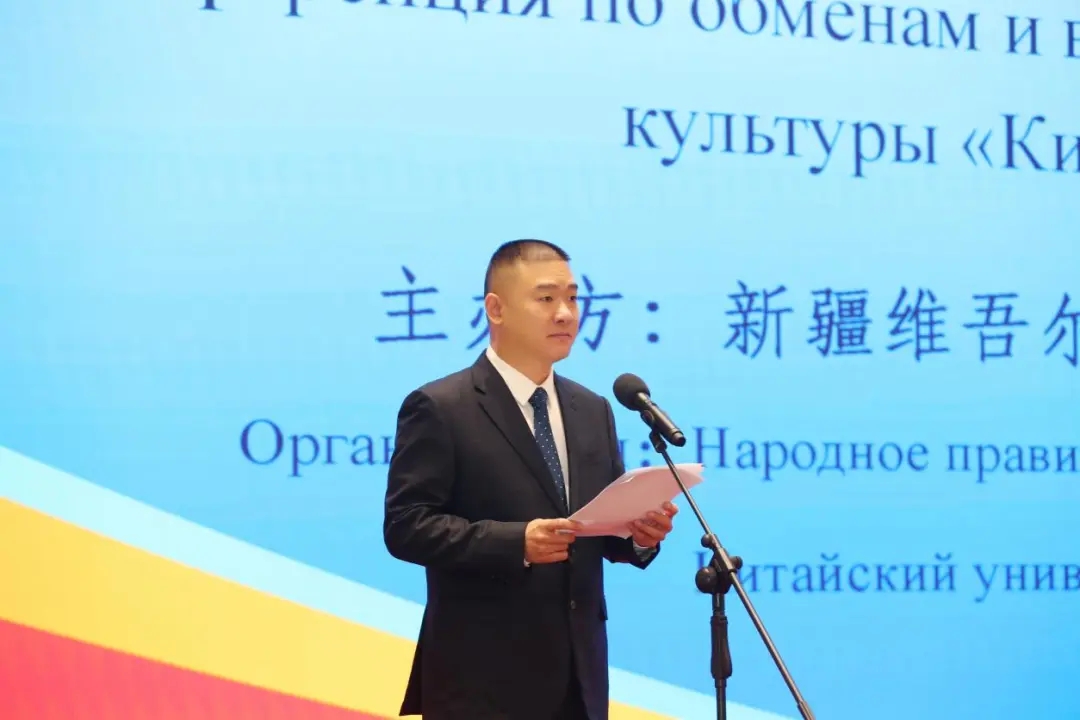
Pan Xi, Vice Chairman of the People's Government of the Xinjiang Uygur Autonomous Region, presided over the opening ceremony
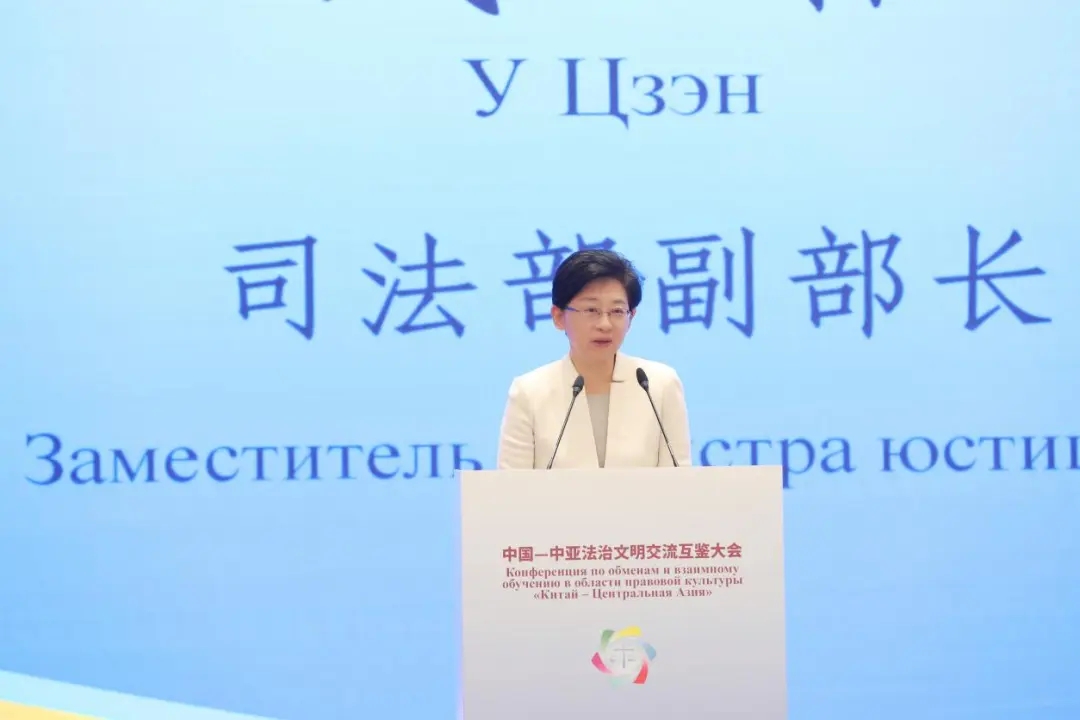
Wu Zeng, Vice Minister of Justice, delivered a speech
On behalf of the Ministry of Justice, Wu Zeng extended warm congratulations on the convening of the conference. He stated that the Ministry attaches great importance to and actively promotes the high-quality co-development of the Belt and Road Initiative, striving to provide robust legal safeguards for the prosperity and development of China and Central Asian countries. He emphasized the need to elevate legal cooperation between China and Central Asia to a new level through deepened legislative exchanges, enhanced collaboration in law enforcement and judiciary, improved legal services, strengthened cultivation of legal talent, and increased exchanges in legal education. He expressed his hope that all parties present would work together to make new and greater contributions to building a closer China-Central Asia community with a shared future.
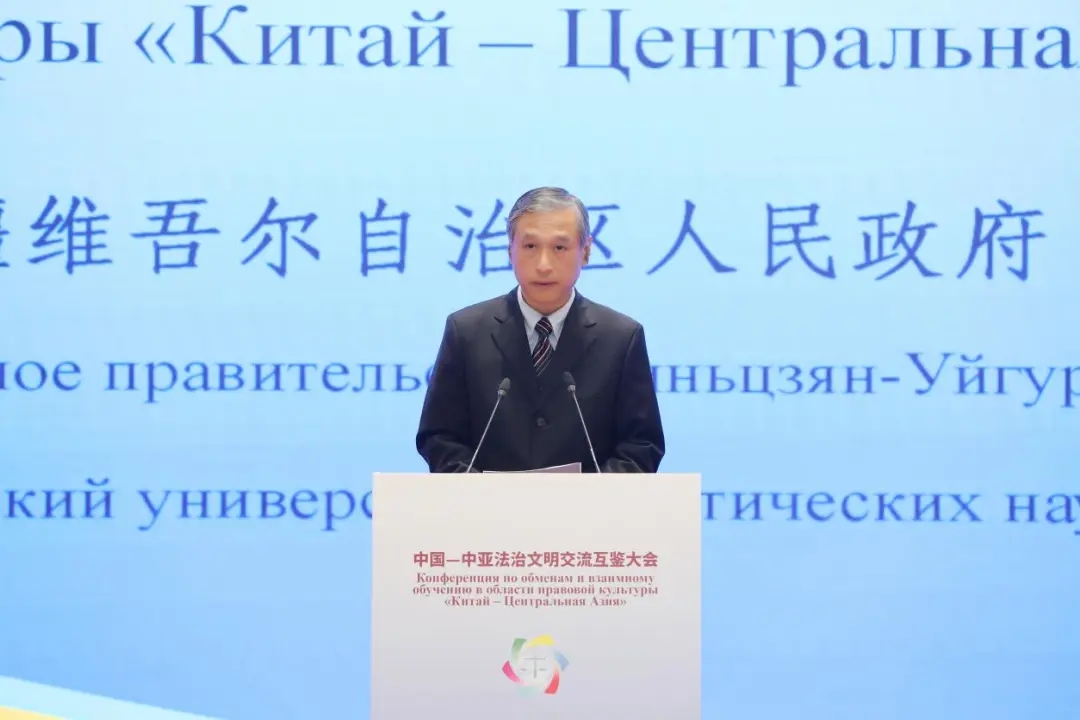
Qian Feng, Vice President of the China Law Society, delivered a speech
On behalf of the China Law Society, Qian Feng conveyed warm congratulations on the successful opening of the conference. He remarked that this grand event serves as a concrete step to jointly carry forward the “China-Central Asia Spirit” and an important platform to deepen regional legal cooperation while fostering civilizational exchange and mutual learning. Qian put forward a proposal from the China Law Society for building a closer China-Central Asia community with a shared future, outlining three key areas: deepening the alignment of legal strategies to solidify the institutional foundation for legal cooperation; engaging diverse stakeholders to create an open and inclusive ecosystem for legal cooperation; and promoting the mutual learning and integration of civilizations to contribute Central Asian legal wisdom to global governance. The China Law Society stands ready to work with counterparts from Central Asian countries to translate the wisdom of legal civilizations into a powerful force for peace and development.
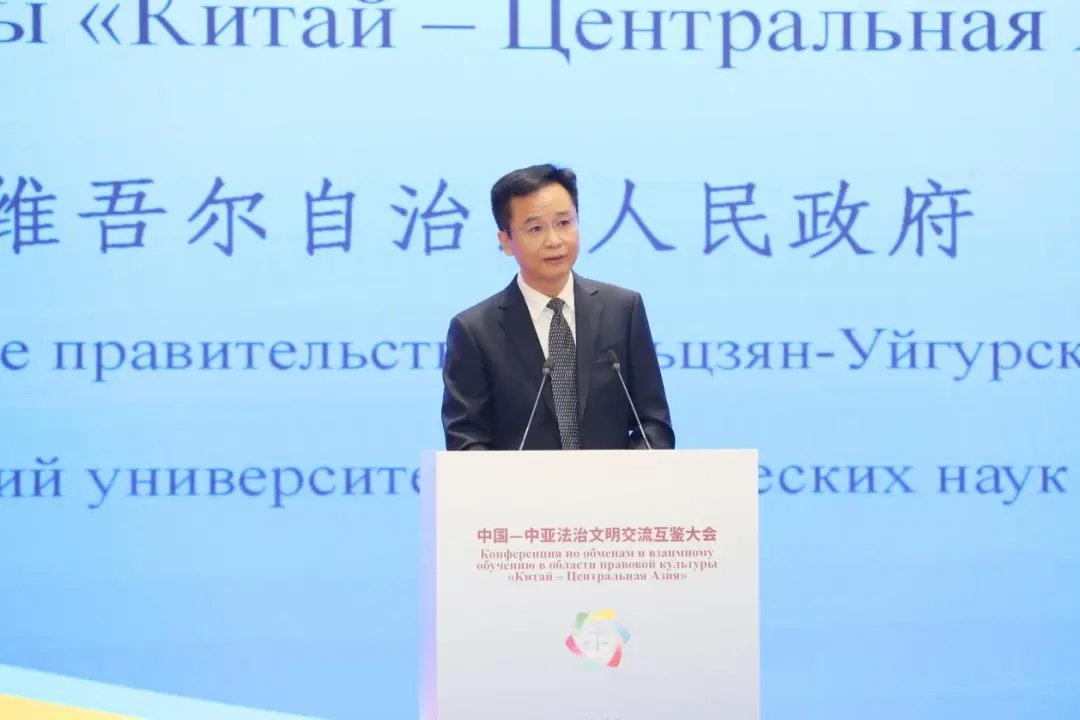
Chen Mingguo, Deputy Party Secretary of the CPC Xinjiang Uygur Autonomous Region Committee and Secretary of the Political and Legal Affairs Commission, delivered a speech
On behalf of the CPC Xinjiang Uygur Autonomous Region Committee and the regional government, Chen Mingguo delivered a speech. He stated that Xinjiang has been thoroughly implementing the spirit of the China-Central Asia Summit, actively deepening practical cooperation with Central Asian countries across various fields, and working to establish Xinjiang as a legal services hub that extends its reach to Belt and Road countries and regions. With the theme of exchanges and mutual learning of legal civilizations, this conference will undoubtedly inject strong impetus into jointly advancing the exchanges and cooperation of China-Central Asia legal civilizations, thereby boosting the Belt and Road Initiative. Moving forward, Xinjiang will work with Central Asian countries to: deepen joint development of the legal civilizations and consolidate the foundation of cooperation with consensus on the rule of law; enhance academic exchanges and pool value recognition through mutual learning of the rule of law; and advance talent cultivation and invigorate innovation through joint talent development—all contributing to a new legal chapter for the China-Central Asia community with a shared future.
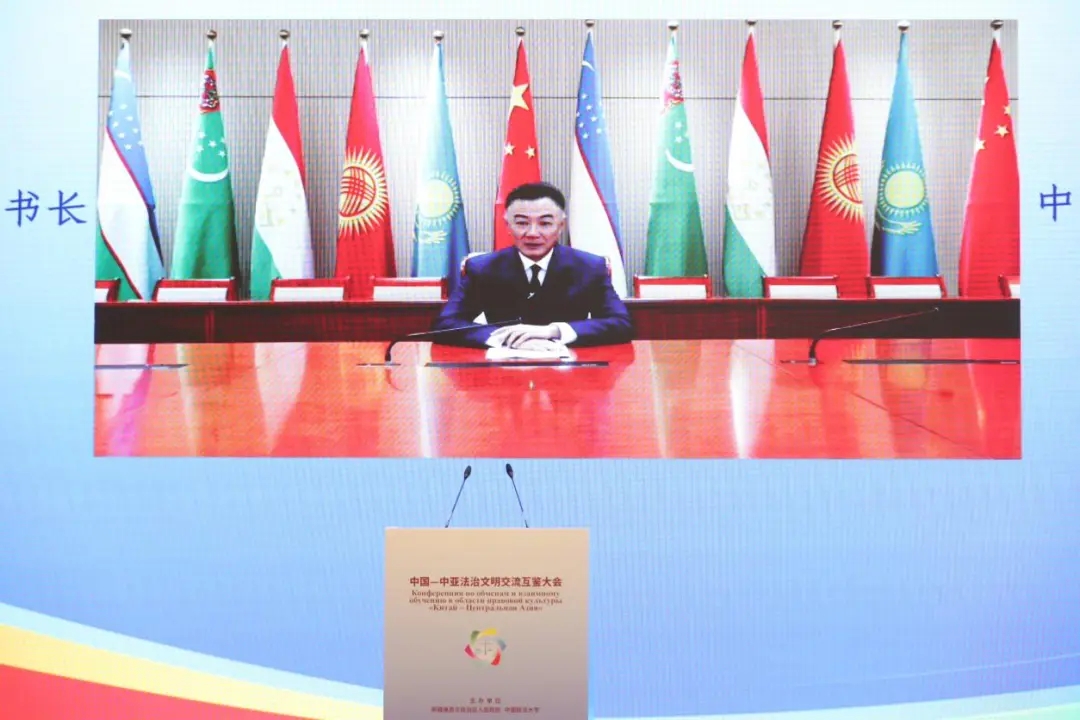
Sun Weidong, Secretary-General of the China-Central Asia Mechanism, delivered a speech
In his address, Sun Weidong, Secretary-General of the China-Central Asia Mechanism, noted that this conference would serve to deepen and solidify exchanges between China and Central Asian countries in legal civilizations. It is hoped that all universities would take the “China-Central Asia Legal Education Alliance” as a platform to integrate academic resources, deepen academic exchanges, and jointly cultivate high-calibre legal talent. This would support the six nations in building a law-based business environment and leveraging the judiciary’s crucial role in resolving international disputes. At the same time, it is hoped that member states of the mechanism would address global governance challenges through legal consensus and cooperation, thereby contributing China-Central Asia strength to the reform and improvement of global governance.
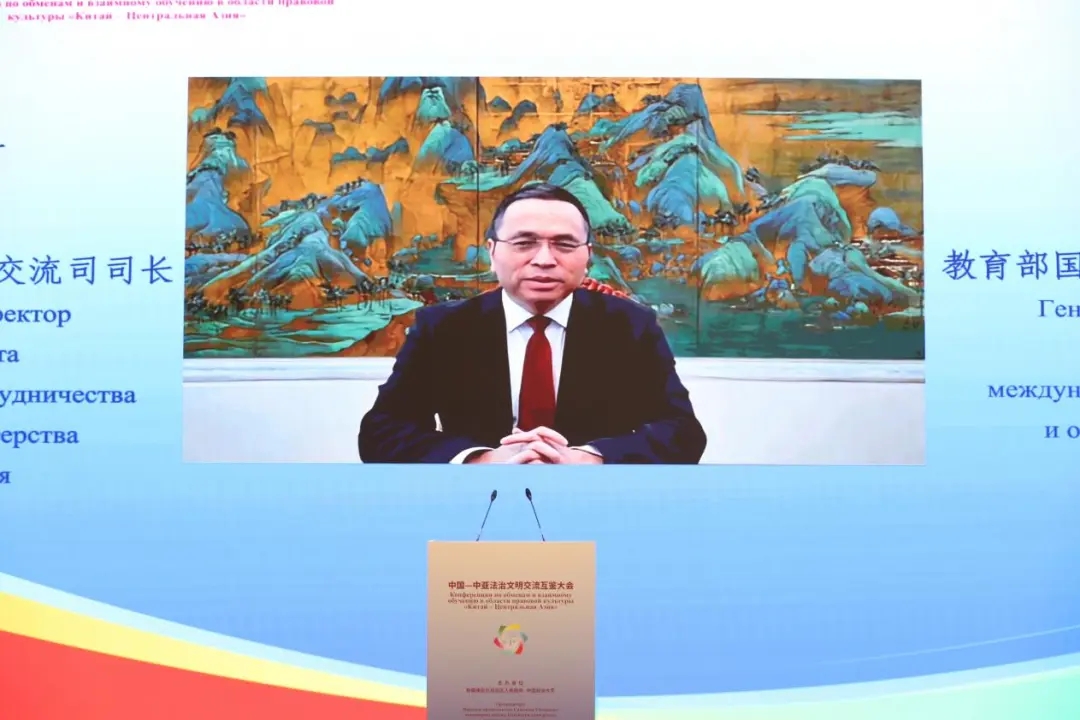
Yang Dan, Director-General of the Department of international Cooperation and Exchange of the Ministry of Education, delivered a speech
Yang Dan, Director-General of the Department of International Cooperation and Exchange of the Ministry of Education of the People’s Republic of China, stated in his speech that the common goal of establishing a new higher education cooperation system for joint talent cultivation, proposed at the inaugural China-Central Asia Ministers of Education Meeting this May, has garnered positive responses from Central Asian countries. To elevate China-Central Asia cooperation in legal and educational fields to a higher level, it is hoped that all partners would work together to: cultivate outstanding legal talent for regional development; build interactive platforms for legal interaction to facilitate regional cooperation; and conduct joint research on intelligent governance tools to lead the transformation of rules.
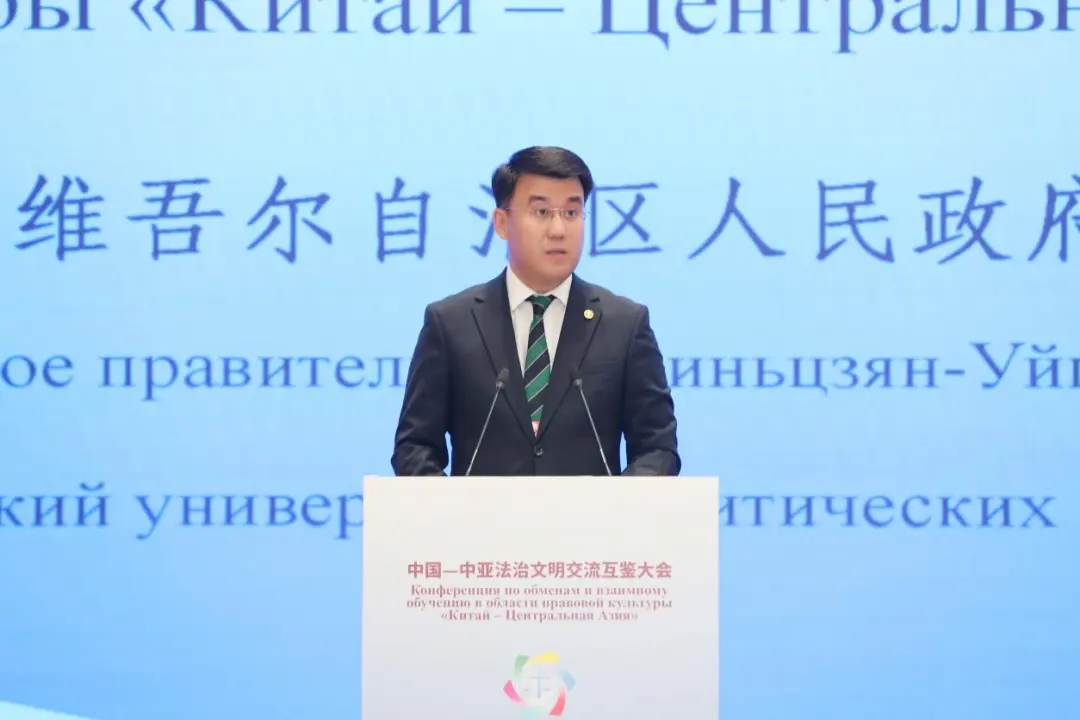
Омаров Бакытжан Бауржанович, Vice President of Al-Farabi Kazakh National University,delivered a speech
Омаров Бакытжан Бауржанович, Vice President of Al-Farabi Kazakh National University, noted that his university has forged close partnerships with Chinese universities and institutions. Through cooperation projects and international seminars, we have continuously deepened mutual trust and worked together to build a unified educational space. Today’s conference has built a platform for civilizational dialogue with law as its bridge and education as its foundation, one that reinforces the vision of a shared future through exchanges and mutual learning among legal civilizations. He added that such enhanced understanding among peoples would bring nations closer together in cooperation, contributing to greater global peace and stability. Universities in China and Central Asia, he affirmed, would continue to deepen practical cooperation in cultivating a new generation of talents who are law-abiding, culturally aware, and dedicated to peace.
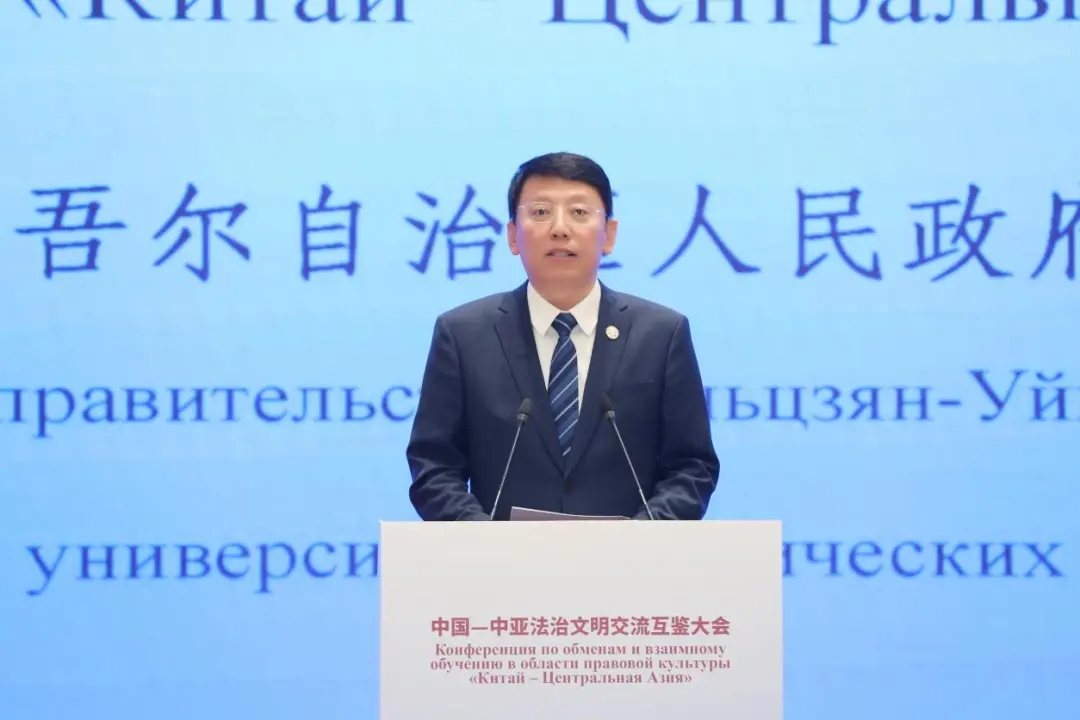
Jiang Zeting, Chair of the University Council, deliverd a speech
Jiang Zeting, CUPL Council Chair, pointed out in his speech that strengthening the exchanges and mutual learning of legal civilizations is a practical measure to implement the Global Governance Initiative. The conference, he noted, has been guided by a clear vision—featuring well-defined themes, focused priorities, and pragmatic efficiency—centering its discussions on cultivating high-caliber legal professionals with global competence, optimizing international commercial dispute resolution mechanisms, and addressing AI governance. This marks a significant stride toward fostering structured dialogue, promoting innovative and collaborative development, and establishing regular mutual cooperation. As the secretariat of the “China-Central Asia Legal Education Alliance”, CUPL is committed to providing high-quality services for all members of the Alliance, translating the consensus on exchanges and mutual learning into tangible results for common development.
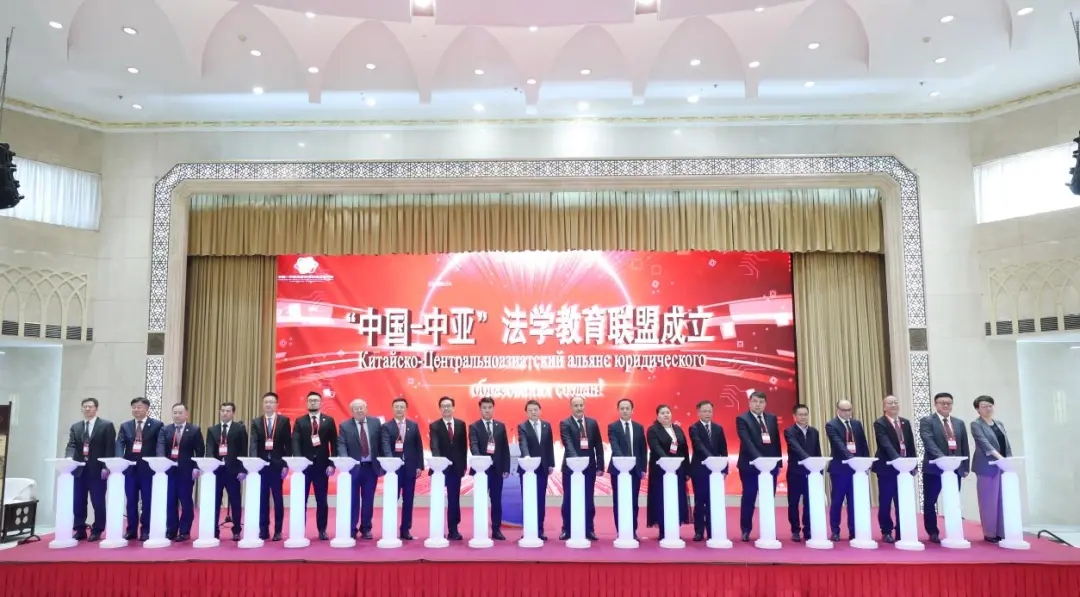
China-Central Asia Legal Education Alliance established
As one of the landmark achievements of the conference, participating universities jointly launched the “China-Central Asia Legal Education Alliance”, with its Secretariat located at the CUPL Institute of Law-Based Governance of Xinjiang. The Alliance, proposed by CUPL, received positive responses from relevant universities. The establishment of the Alliance aims to: create a new mechanism for the exchanges and mutual learning of diverse legal civilizations and create a platform for in-depth exchanges, mutual learning and common development of legal civilizations between China and Central Asian countries; build a new bridge for modernizing regional legal systems by facilitating extensive exchanges on legal civilization and cooperation in legal education, thereby contributing to a more robust and sophisticated regional legal framework; and set a new model for regional legal education cooperation by promoting resource sharing and complementary strengths among member institutions, ultimately forming a distinctive regional community of legal education.
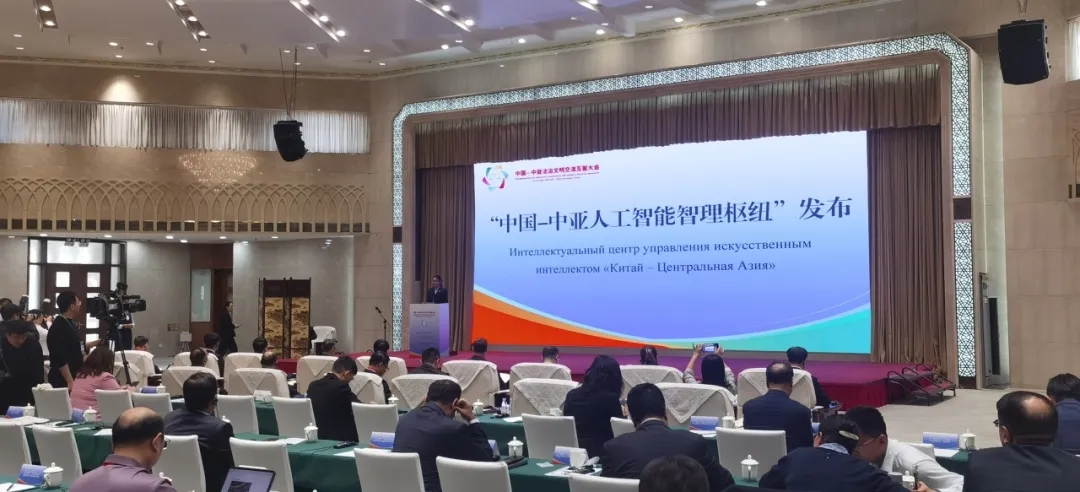
Zhang Linghan, Dean of the AI Law Research Institute of CUPL, unveiled the China-Central Asia AI Intelligent Governance Hub
Zhang Linghan, Dean of the AI Law Research Institute of CUPL, unveiled the China-Central Asia AI Intelligent Governance Hub. This initiative represents a significant innovation aligned with national strategy and enhances AI application cooperation within the Shanghai Cooperation Organization (SCO). The platform serves as a “one-stop hub” integrating regulatory mutual learning, cross-border data flow, and legal services. Through its interactive world maps, cloud-based compliance workspaces, and knowledge-sharing salons, it provides targeted compliance support for Chinese enterprises expanding globally while fostering deeper integration of regional digital economies.
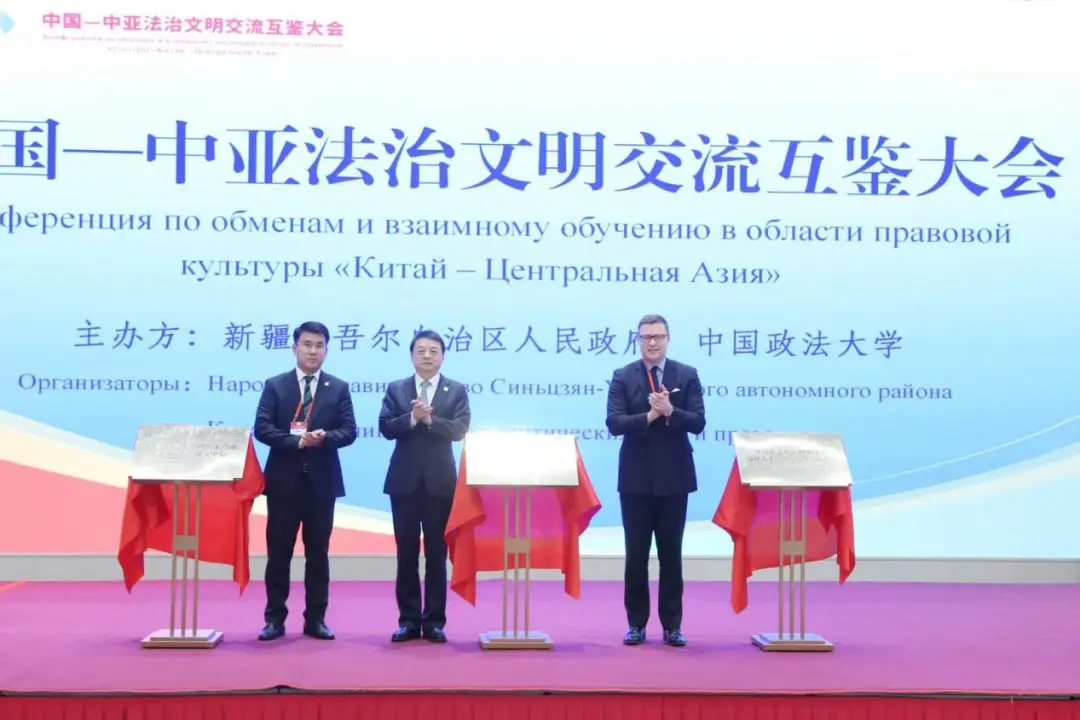
Plaque-unveiling ceremony
Ma Huaide, President of CUPL, and Омаров Бакытжан Бауржанович, Vice President of Al-Farabi Kazakh National University, jointly inaugurated the China-Kazakhstan Center for Artificial Intelligence and International Legal Civilization. Leveraging the disciplinary advantages of CUPL and Al-Farabi Kazakh National University in law and AI, the Center continuously conducts in-depth dialogues on promoting the coordinated development between AI and rule of law. As the first cross-university cooperative entity between China and Kazakhstan in this field, the Center is positioned as an “academic research hub, talent cultivation base and international cooperation platform”. It will concentrate on three key areas: AI legal regulation, ethical governance, and practical application, addressing bilateral needs between China and Kazakhstan while contributing to regional governance in Central Asia.
Ma Huaide and Christopher Campbell-Holt OBE, Registrar and Chief Executive Officer of the Astana International Financial Center (AIFC) Court and International Arbitration Center (IAC), unveiled the China-Kazakhstan International Arbitration Research Institute and the CUPL-Astana Legal Talent Training and Overseas Practice Base. The Research Institute, established through collaboration between CUPL and the Astana IAC, will serve as a platform for arbitration exchange and research between China and Central Asian nations. It aims to contribute expertise to the development of regional arbitration and enhance the region’s standing in international arbitration. The Legal Talent Training and Overseas Practice Base, jointly built by CUPL, the Astana AIFC and IAC, is designed to provide law students with practical training and hands-on experience in commercial courts and arbitration centers.
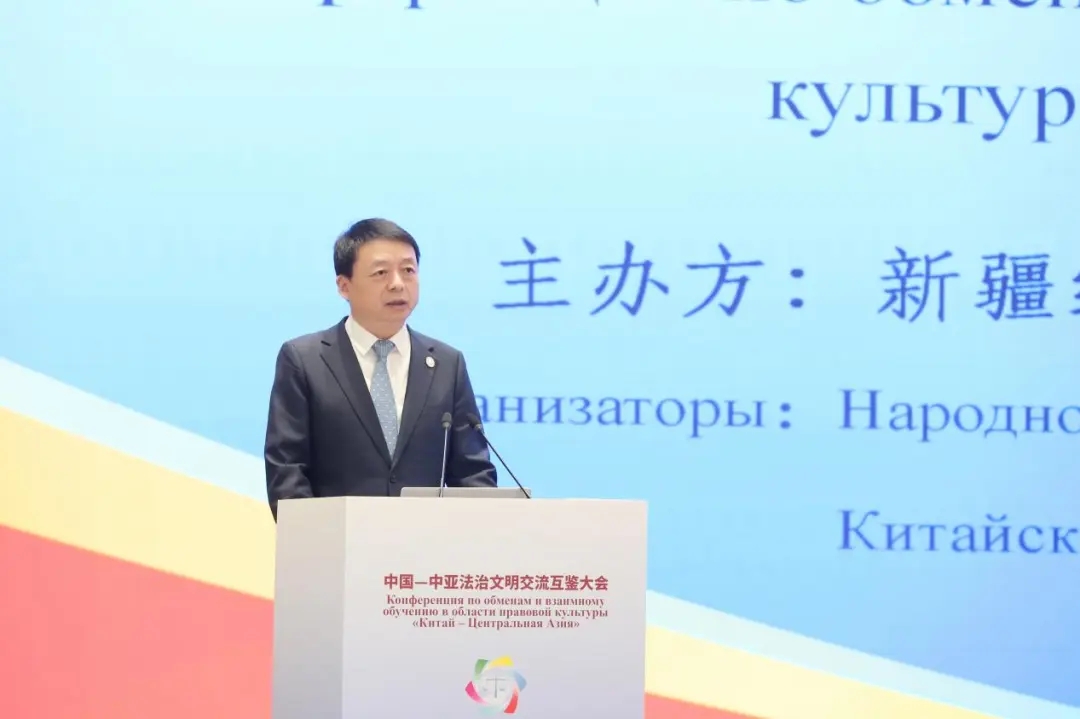
Ma Huaide, Vice Chair of the University Council, delivered the keynote address
In his keynote speech, Ma Huaide stated that addressing contemporary challenges in rule of law development requires upholding historical legacy, fostering exchange and mutual learning, and maintaining a practice-oriented approach to accelerate the formation of a distinctively Chinese legal academic system. He stressed the need to refine the foundational, original, and defining concepts, viewpoints, and theories of socialist rule of law with Chinese characteristics to achieve theoretical and practical breakthroughs. Drawing upon Chine practice of building a country under the rule of law, it is essential to deepen the modern transformation of fine traditional Chinese legal culture, realize the localized adaptation of foreign legal academic resources, strengthen the theoretical distillation of contemporary legalpractice, and conduct in-depth research on complex and difficult issues in current legal practice.
The keynote speech session was presided over by Yu Fei, Vice President of CUPL. Thirteen representatives from Chinese and Central Asian universities delivered keynote speeches addressing the mission of universities in the era of mutual learning, the construction and development of the China-Central Asia Legal Education Alliance, building the legal foundation for the China-Central Asia community with a shared future, and AI-empowered cultivation of foreign-related legal talents. All attendees agreed that universities in the Alliance should conduct sincere cooperation for win-win results. They emphasized the need to explore new pathways and paradigms for cooperation in legal education and research, to produce high-quality outcomes consistently, and to expand into new collaborative areas. It is necessary to attract more universities and institutions to join, pool broader wisdom and resources, and jointly build the Alliance into a dynamic, high-caliber platform capable of continuously generating innovative ideas and nurturing outstanding talent. This endeavour aims to establish the Alliance as an important engine for the exchanges and mutual learning of legal education and legal civilizations between China and Central Asian countries, thereby contributing to the modernization of regional and even global governance.
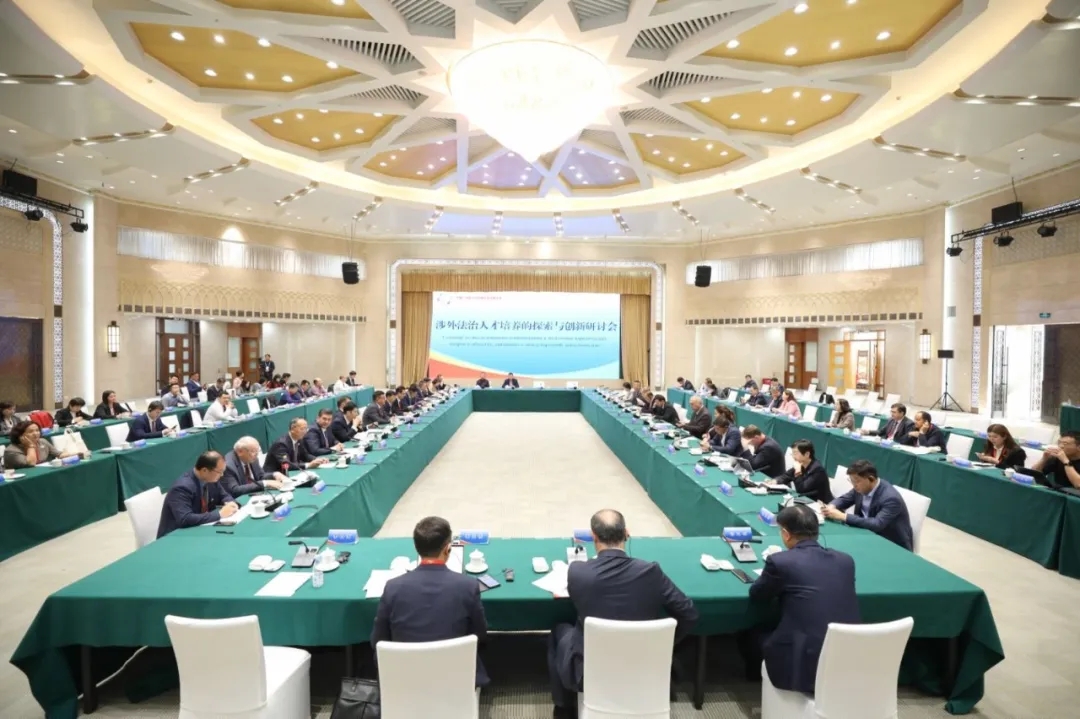
In the afternoon, two parallel seminars were held: the “Seminar on Exploring and Innovating Training Models for Foreign-Related Legal Talent” and the “China-Central Asia Semniar on World-Class International Business Environment and International Commercial Arbitration”. Focusing on the legal cooperation needs between China and Central Asia under the Belt and Road Initiative, participating experts and scholars delved into experiences and innovative approaches in cultivating foreign-related legal talent. They also explored how to foster a stable, fair, transparent and predictable first-class international business environment for the growing economic and trade ties between China and Central Asian countries through enhanced legal cooperation and improved arbitration mechanisms.
The closing ceremony was chaired by Fan Jiuli, President of Northwest University of Political Science and Law. Concluding remarks were delivered by Cai Lidong, Deputy President of Jilin University; Назаров Аваз Кувватович, Vice President for International Affairs of Tajik National University; and Li Weihai, Dean of the CUPL Institute of Law-Based Governance of Xinjiang. The speakers unanimously affirmed that this conference has built a new platform for exchanges and dialogues on legal civilizations, innovated a new mechanism for regional legal education cooperation, and established a new model for the cultivation of legal talent. The legal cooperation between China and Central Asian countries holds immense potential and broad prospects.
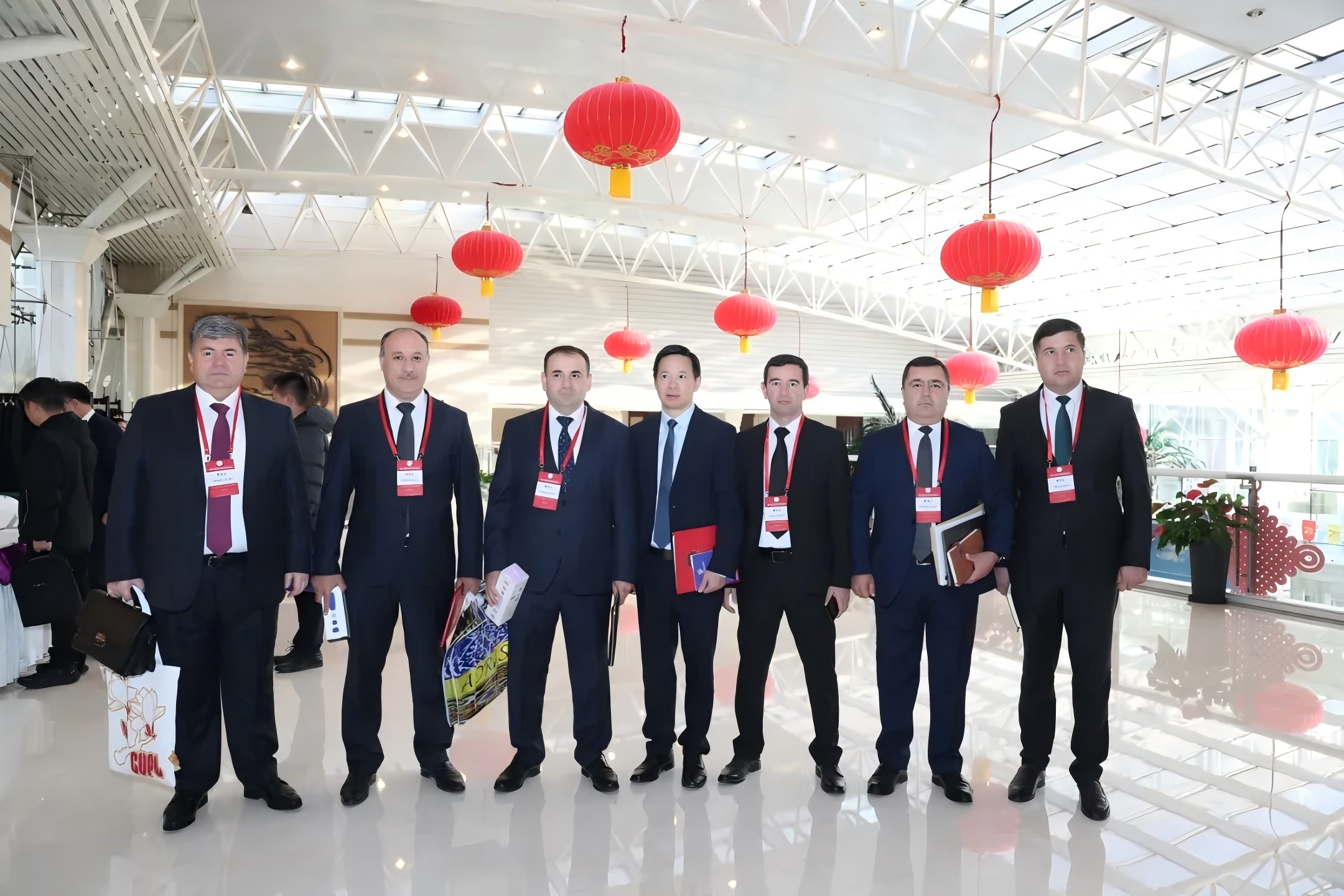
As a Chinese saying goes, “No mountain or ocean can distance those with shared aspirations.” In line with this spirit, CUPL visited Central Asian countries at the end of May, reaching a series of cooperation consensuses with local judicial institutions, legal practice institutions and renowned universities on the cultivation of foreign-related legal talent and collaborative regional legal education. Marking a new beginning in legal civilization exchanges, the university formed the first “Publicity Delegation on Exchanges and Mutual Learning of Legal Civilizations” to Tajikistan from October 13 to 14 for promotional and exchange activities. The China-Central Asia Conference on on Legal Civilization Exchange and Mutual Learning embodies the “China-Central Asia Spirit” and represents a concrete step in practicing the principles of extensive consultation, joint contribution and shared benefits in global governance. It also stands as an important achievement in following the spirit of the first China-Central Asia Ministers of Education Meeting. Looking ahead, China and Central Asian countries will surely write more brilliant chapters of mutual appreciation of legal civilizations, contributing to the prosperity of global legal heritage and the building of a community with a shared future for mankind.
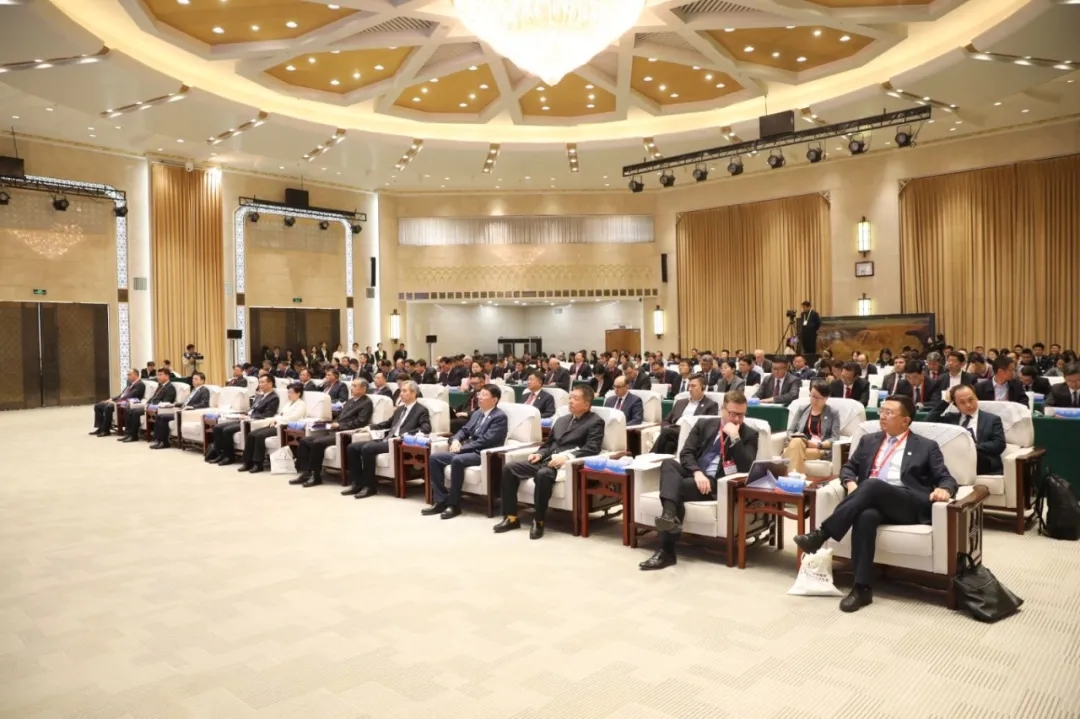
The conference garnered significant media attention, with leading outlets such as People’s Daily, Xinhua News Agency, China Central Television (CCTV), Guangming Daily, China News Service (CNS), Xinjiang Daily and Xinjiang Television conducting on-site coverage.

